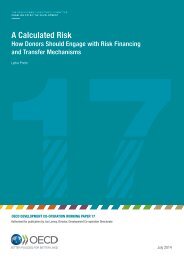UNIVERSITY
Livelihood_resilience_working_paper22
Livelihood_resilience_working_paper22
Create successful ePaper yourself
Turn your PDF publications into a flip-book with our unique Google optimized e-Paper software.
Recommendation 3: <br />
Empowerment of poor and vulnerable people is crucial in building livelihood resilience xlv <br />
New approaches are urgently needed to uphold social justice in years to come. Opportunities exist <br />
for institutions to address the needs of vulnerable people in ways that promote human rights and <br />
economic development. These institutions include government, the private sector and civil society. <br />
Civil society can play a role in organizing community-‐level structures and shaping demands for <br />
change. Existing humanitarian, development and climate financing can be leveraged to provide <br />
measures for safeguarding the livelihoods of vulnerable populations from the impacts of climate <br />
change and other environmental stressors. <br />
The poorest and most vulnerable members of society suffer the most from climate change, despite <br />
contributing the least. These groups may become further exposed to inequalities and power <br />
imbalances, seriously inhibiting economic development. <br />
A range of policy options can protect the most vulnerable from climate change and environmental <br />
hazards, including: <br />
-‐<br />
-‐<br />
-‐<br />
-‐<br />
-‐<br />
Social safety nets (e.g. conditional or unconditional cash transfer, vulnerable group feeding <br />
etc.) <br />
Risk transfer tools (e.g. micro-‐insurance or social insurance) <br />
Labour market interventions (e.g. minimum wage legislation) <br />
Community-‐based or ‘informal’ social protection (e.g. community-‐level savings groups) <br />
Good Governance (e.g. stringent legal frameworks to implement social protection <br />
programmes) <br />
Social protection measures should be given priority when considering ways of maintaining the rights <br />
of vulnerable communities. Exploitative political-‐economic conditions at all levels including <br />
international, national, sub-‐national and grassroots hinder the resilience of the most vulnerable <br />
groups. It is vital to identify these conditions to improve the lives of vulnerable people. A strong <br />
political will for good governance is required to develop stringent legal frameworks to implement <br />
social protection schemes in response to climate change. Without such frameworks vulnerable <br />
groups will be even more susceptible to the socio-‐economic consequences of climate change. <br />
xlv This recommendation was originally drafted by Christopher Lawless, David Lewis, Raphael Nawrotzki, Gaetano Vivo, <br />
Zinta Zommers, Sarah Henly-‐Shepard, Malashree Bhargava and Saleemul Huq during the second Resilience Academy and <br />
subsequently edited by Sonja Ayeb-‐Karlsson, Thomas Tanner, Kees van der Geest and Koko Warner who take full <br />
responsibility for the content.



